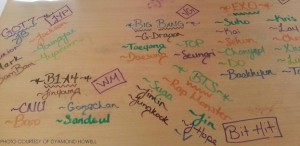

A wall full of posters. A bookshelf full of every magazine they’ve ever been in. A calendar marked with their birthdays. Some would think, “Wow. That’s a die-hard fan,” while others would think, “That person must be obsessed.” But is there really a difference?
To define the line, we must first define the terms. Fandom can be described as a group of people with a common interest for a book, person, activity, etcetera. An obsession is described as a constant fixation with a book, person, activity, etcetera. Obsessions are often looked at as abnormal because the person usually spends more time focused on a particular subject than others.
Certain fanbases and fandoms are known for being more “obsessive” than others. A popular fandom with a bad reputation is the Beliebers. “Belieber” is the term coined by Canadian popstar and bad boy, Justin Bieber.
Recently, a troll group of anti-Beliebers took to Twitter to poke fun at the fanbase by starting a campaign called “Operation: Cut for Bieber,” with the faux purpose of getting Justin Bieber to stop smoking marijuana after a picture surfaced of the singer and friends experimenting with the drug. The movement took to Twitter until fans were posting actual pictures of actual wounds. UnBelieb-able!
A similar incident happened in Korea when a hardcore fan of the K-Pop group The Wonder Girls cut herself and then wrote “come back Wonder Girls” in her own blood. The group was doing promotions in the US at the time.
In Korea, those obsessive fans are known as sasaeng fans. Sam Lansky, an editor for New York Times and The Atlantic defined “sa” as meaning “private” and “saeng” as meaning “life,” which references these so-called “fans” questionable practices and the lengths they will go to in order to meet these celebrities.
Yim Seung-Hye, a write for the Korea JoongAng Daily, wrote an article entitled “When an autograph isn’t enough,” journaling the life of one self-proclaimed “ex-sasaeng.” Kwon is a 17-year-old high school dropout who follows the daily schedules of idols. She quit high school because the travel between her hometown and Seoul, the main location of idol activities, was beginning to cost too much.
It’s almost possible to be a fan of anything, and with several die-hard fans here at Leesville, I wanted to know how students viewed fandoms and where they ranked in terms of being a fan or being obsessed.
Abbey Tarnowski, junior, believes that it is possible to be both obsessed and a fan because she is an obsessive fan of the Patriots. “During the season, they’re all I think about, but I’m also into them. Not just plain crazy. If you support the person, that’s a fan, but if you just have a wall of pictures of them, that’s obsessed.”
Uniqua McFadden, senior, disagrees. McFadden believes that there is a blatant difference between the two and being obsessive is not okay. A die-hard fan of rapper Drake, McFadden would describe being obsessive as a constant thirst for that person’s attention. “Being obsessed is when you chase people around and act like you’re thirsty. Being a fan is being true to [a celebrity].”
I believe that there is no definite line between fandom and obsession, but there is a line between healthy and unhealthy. Having experience in the world of fandoms, with my K-Pop obsession, I have been called addicted, crazy and even a borderline stalker.
However, there are obvious signs at which a fandom or obsession becomes dangerous. James Chapman, a British journalist for the Daily Mail, brings it to light in his 2003 article entitled “Do you worship the celebs?”
Chapman outlines a newly identified psychological syndrome called Celebrity Worship Syndrome (CWS). One theory states that it could be caused by a media dominated society in which celebrities have taken the places of actually loved ones.
There are three types of CWS, the first one, which I believe that I suffer from is mild CWS. Those in this group were typically extroverts who have lots of friends. Unfortunately — at least for their friends — they tended to talk about this celebrity constantly.The second group suffered from moderate CWS, meaning they felt as though they had an intense personal relationship with their idol.
The final group suffered from hardcore CWS, meaning their obsession was borderline pathological.
Most teenagers try to find someone to idolize or model themselves after. At an easily impressionable age, it is difficult not to fall into the clutches of an unhealthy obsession.
A few idols are okay, but once it starts to negatively impact the ability to function in normal society, that’s when it’s time to close the laptop, turn off the TV, put down the cellphone and enjoy some quality time with real-life loved ones to bring oneself back to reality.
[…] Howell, D (2014). When fandoms turn into unhealthy obsessions. Retrieved from https://www.themycenaean.org/2014/04/when-fandoms-turn-into-unhealthy-obsessions/ […]